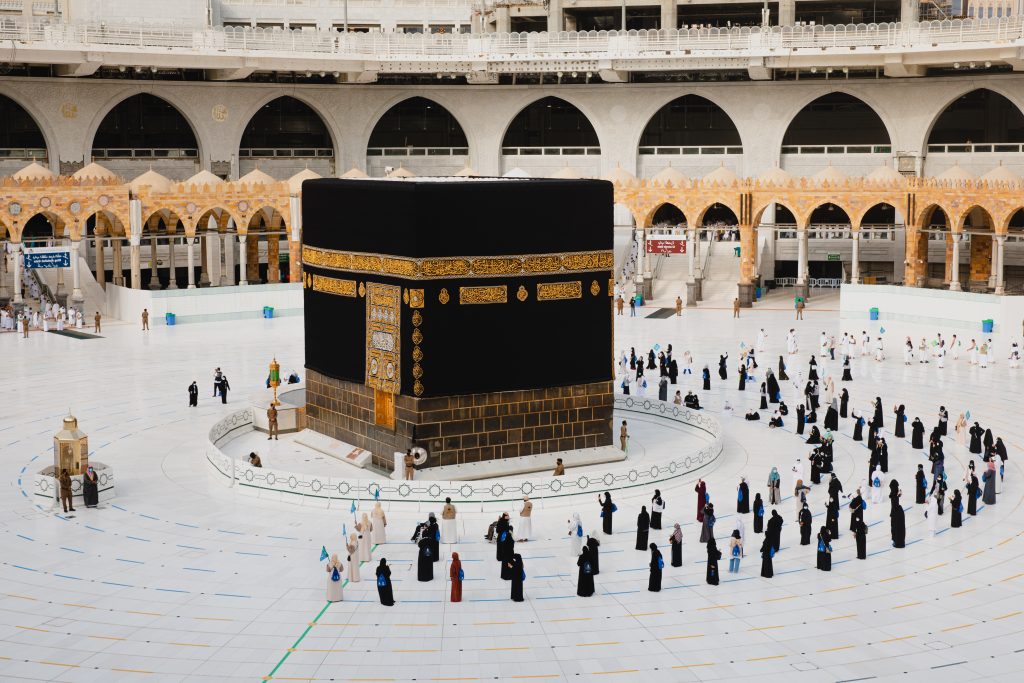
Worship encompasses all aspects of life.
All forms of worship are meaningful.
Ulama Institute #1
Looking to learn Arabic or memorize the Quran?
Check our Trusted Teachers

وَمَا خَلَقْتُ ٱلْجِنَّ وَٱلْإِنسَ إِلَّا لِيَعْبُدُونِ ( سورة الذاريات : ٥٦)
“And I did not create the jinn and mankind except to worship Me.” [Soorat ad-Dhaariyaat:56]
This aayah contains the answer to mankind’s most daunting question. This question is the subject of many philosophical discourses, and attempts to find answers to it occupy a significant position in mankind’s collective history.
Such attempts shaped the way many see the world today, and it is responsible for the many deviant worldviews pravalent in the times we live in.
The importance of the solutions provided by this aayah can never be overstated. “What is the purpose of creation? Why has man been created? These are the fundamental questions answered by Allah in this portion of the Glorious Revelation to mankind. It places worship at the innermost core of human existence; the purpose of creation.
Based on the fundamental belief derived from this aayah i.e. man has been created to worship Allah ﷻ , there is no uncertainty concerning the importance Islam places on worship.
This is significant to the definition and essential quality of worship according to Islam. Worship literally means ascribing supreme value to something, whereas the Islamic definition of it extends far beyond showing reverence to a deity. It implies complete servitude to Allah ﷻ, thus including all aspects of human existence. The Islamic definition of worship can be cited as being any internal or extemal action of man that Allah ﷻ loves and which is done with the specific purpose to gain His pleasure. This definition includes both ritual observances as well as all other actions considered as “worldly” by other religions. The Qur’aan, in the following aayah, criticizes adherence to empty, meaningless rituals. It mentions aspects of belief, ritual observances such as Salah and Zakah, and actions such as fulfilling a promise and being patient as righteous actions constituting worship.
لَّيْسَ ٱلْبِرَّ أَن تُوَلُّوا۟ وُجُوهَكُمْ قِبَلَ ٱلْمَشْرِقِ وَٱلْمَغْرِبِ وَلَـٰكِنَّ ٱلْبِرَّ مَنْ ءَامَنَ بِٱللَّهِ وَٱلْيَوْمِ ٱلْـَٔاخِرِ وَٱلْمَلَـٰٓئِكَةِ وَٱلْكِتَـٰبِ وَٱلنَّبِيِّـۧنَ وَءَاتَى ٱلْمَالَ عَلَىٰ حُبِّهِۦ ذَوِى ٱلْقُرْبَىٰ وَٱلْيَتَـٰمَىٰ وَٱلْمَسَـٰكِينَ وَٱبْنَ ٱلسَّبِيلِ وَٱلسَّآئِلِينَ وَفِى ٱلرِّقَابِ وَأَقَامَ ٱلصَّلَوٰةَ وَءَاتَى ٱلزَّكَوٰةَ وَٱلْمُوفُونَ بِعَهْدِهِمْ إِذَا عَـٰهَدُوا۟ ۖ وَٱلصَّـٰبِرِينَ فِى ٱلْبَأْسَآءِ وَٱلضَّرَّآءِ وَحِينَ ٱلْبَأْسِ ۗ أُو۟لَـٰٓئِكَ ٱلَّذِينَ صَدَقُوا۟ ۖ وَأُو۟لَـٰٓئِكَ هُمُ ٱلْمُتَّقُونَ ( سورةالبقرة: ١٧٧)
“Righteousness is not that you turn your face to the east or to the west, but [true] righteousness is [in] one who believes in Allah, the Last Day, the Angels, the Book, and the Prophets and gives wealth in spite of his love for it, to relatives, orphans, the needy, the traveler, those who ask [for help] and for freeing slaves; [and who] establishes Salah, gives Zakah; [those who] fulfill the promise when they promise; and [those who] are patient in poverty and hardship, and during battle. Those are the ones who have been true, and it is those who are righteous.” (Soorat al-Baqarah: 177)
This aayah supports the above definition of worship, as being all-inclusive of every action man is capable of doing. This is the most important characteristic of worship in Islam. This makes Islam a practical religion and a religion that could be practiced in everyday life.
We have identified three main types of actions as far as worship is concerned. These are:
- Beliefs
- Ritual observances
- Other positive actions
Ritual worship plays a key role in a Muslim’s life. These are mainly the five pillars of Islam; they are the Shahadah, Salah, Zakah, Saum and Hajj. The distinctive quality in all these forms of worship is that they are not mere instruments by which Allah tests the obedience of His ﷻ slaves, but they are rather means by which man can grow in every facet of his life.
Salah, for example benefits a Muslim on various levels. Salah has to be performed at prescribed times from dawn until the evening, so observing it punctually requires discipline. Thus one, who performs Salah in its proper time, learns discipline and punctuality from it, besides the spiritual merits of Salah like gaining closeness to Allah ﷻ , having peace of mind, and protecting oneself from evil actions and the plans of Satan. On the social level, Salah shows people true brotherhood.
Zakah is no different from Salah in that it conveys valuable guidance to those who practice it as well as countless benefits to those who receive it. It is not merely about the rich paying a tax, rather it is an act of kindness through which the giver hopes to gain closeness to Allah ﷻ It also serves so many social functions: giving Zakah creates an actual bond between the wealthy and the poor.
Saum teaches the individual self-restraint, something the world has forgotten in its licentious consumerist frame of mind. It gives those who are better off the opportunity to share in the difficulty of hunger as well as gain a number of medical benefits listed by physicians.
Hajj has the ideals of the brotherhood of man and the unity of the Ummah at its root, all enshrouded in rich and meaningful rituals. Standing on ‘Arafah, which is the essence of the Hajj, gives man a glimpse into that day towards which the lives of all Muslims are directed, the Day of Judgment. The two single pieces of unstitched clothes worn by the haajj act as an equalizer of man, where all people, rich and poor, meek and powerful cannot be distinguished from one another, all are equal in the sight of Allah ﷻ .
The most excellent characteristic of worship in Islam is its broad definition where it includes all positive acts that are pleasing to Allah done for His sole pleasure. Every act of worship in Islam has definite benefits for those who perform them with due conformity to Allah’s guidelines.







